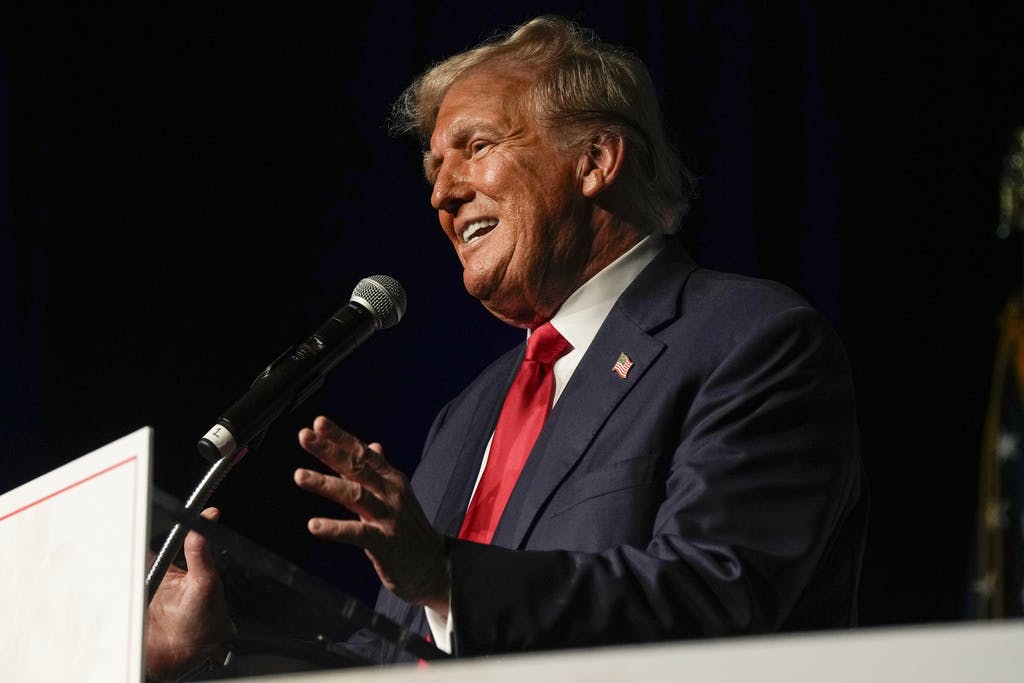Some Minnesota Voters Want Trump Off Ballot for Inciting ‘Insurrection’ on January 6
‘There are some who believe that the Supreme Court will only take this case if there is a decision disqualifying Trump,’ attorney Bryant Messner tells the Sun.

In Minnesota Thursday, the state supreme court will hear a case brought by voters arguing that President Trump should be disqualified from appearing on ballots there because of his involvement in the January 6, 2021, attack on the Capitol — a case that will likely end up at the U.S. Supreme Court if Mr. Trump is disqualified.
The suit in Minnesota is being brought by voters represented by Free Speech for People, a group that says its mission is to “renew our democracy.” The voters’ arguments hinge on the claim that January 6 qualifies as an insurrection. Section 3 of the 14th Amendment bars anyone who has “engaged in insurrection or rebellion” from holding any elected office unless a supermajority in Congress votes to allow them to do so.
“The events of January 6, 2021 amounted to an insurrection or a rebellion under Section 3: a violent, coordinated effort to storm the Capitol to obstruct and prevent the Vice President of the United States and the United States Congress from fulfilling their constitutional roles by certifying President Biden’s victory, and to illegally extend then-President Trump’s tenure in office,” the voters’ petition reads.
Ahead of oral arguments Thursday, lawyers with Free Speech for People warned that Mr. Trump could attempt to overturn future elections if allowed to remain on the ballot.
“Our predecessors understood that oath-breaking insurrectionists will do it again, and worse, if allowed back into power, so they enacted the Insurrectionist Disqualification Clause to protect the republic from people like Trump,” the group’s legal director, Ron Fein, said.
One of the voters bringing the petition, David Thul, a veteran of the Minnesota National Guard, said, “I swore an oath to support and defend the Constitution, and I firmly believe this petition is in keeping with that oath.”
An attorney for Mr. Trump responded to the complaint by arguing that those who brought the case “have no evidence that President Trump intended or supported any violent or unlawful activity seeking to overthrow the government of the United States, either on January 6 or at any other time.”
Mr. Trump’s defense team then goes on to note that Mr. Trump is not the first politician to challenge an election via litigation and that Mr. Trump told the crowd that stormed the Capitol to protest “peacefully” and later told them to “go home.”
“Petitioners identify no fact that could remotely suggest that this course of conduct amounted to ‘engaging in insurrection,’” Mr. Trump’s attorneys write. “Watching some of a riot on television, and then asking that it end, simply is not and could not amount to engaging in insurrection.”
The case in Minnesota is progressing alongside suits in other states seeking to have Mr. Trump disqualified under the 14th Amendment. The most prominent of these other cases is in Colorado, where oral arguments began Monday.
Outside the courtroom, Mr. Trump has characterized the suits against him as “election interference.” At the courthouse in Colorado on Monday, attorney Mike Davis called the disqualification case a “legal Hail Mary by Democrats.”
For all of the disqualification cases against Mr. Trump, there is little legal precedent, and none from recent history. Similar cases were brought against Congresswoman Marjorie Taylor Greene and Congressman Madison Cawthorn, though Ms. Greene won her case, and Mr. Cawthorn’s case became moot after he lost his re-election bid.
In Minnesota, challenges to ballot appearances are tried at the state supreme court. The state’s high court, though, is not expected to be the final court to rule on the subject.
The GOP’s nominee for Senate in New Hampshire in 2020, Bryant Messner, who made headlines earlier this year for meeting with the state’s secretary of state, David Scanlan, to talk about whether Mr. Trump is disqualified, tells the Sun that he expects the cases in Colorado and Minnesota to advance quickly.
“We’re expecting a decision from the judge [in Colorado] before Thanksgiving,” Mr. Messner says. “I think the timeline will be quite frankly a function of what the judge’s decision is.”
Mr. Messner tells the Sun that, in his assessment, these cases will probably move through the appeals process quickly if a judge rules that Mr. Trump is disqualified, saying “that accelerates the timeline.”
“There are some who believe that the Supreme Court will only take this case if there is a decision disqualifying Trump, that is to say that they will not take the case if there are only decisions allowing him to stay on the ballot,” Mr. Messner says.
Mr. Messner added that the “best-case scenario” is that one of these cases ends up before the Supreme Court in the first quarter of next year. In his opinion, only the Supreme Court can properly decide this question.
Correction: An early version of this story misstated the role of attorney Mike Davis in the proceedings. He attended the hearing Monday merely as an interested party and not representing anyone specifically.

